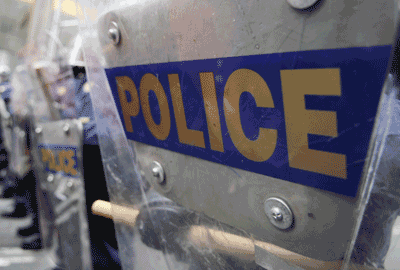Police Prejudice Is Not What You Think

Police photo provided by Shutterstock.
Many police departments have a problem with prejudice — it’s a common assumption supported by empirical research. But when a team of psychological scientists led by Juliette Gatto of Blaise Pascal University, France, took a close look at prejudice in new police recruits, officers with a year of training, and a control group from the general population, they discovered unexpected nuances. The results were published in the European Journal of Social Psychology.
Gatto and her coauthors used surveys to detect evidence of two phenomena that might account for prejudice in the police: selection (the processes through which intolerant individuals are attracted to intolerant institutions or vice-versa) and group socialization (the processes through which membership in a group causes individuals to adapt the group’s norms and attitudes). Among other interesting findings, the researchers concluded that both selection and group socialization contribute to prejudice in the police; however, each phenomenon has distinct origins and effects.
New police recruits did show significantly more prejudice than control participants — evidence of selection. But a closer look at the data revealed that prisoners were the only group against whom the recruits were significantly more prejudiced than the control group was. The new police recruits were not significantly more prejudiced than the control group against the poor, Gypsies, or Arabs. Unlike other marginalized groups, prisoners are directly associated with danger because presumably they have threatened society by violating the law. Therefore, the scientists identified right wing authoritarianism — an ideological belief that favors addressing perceived danger in the social realm through group control, stability, and cohesion — as a likely cause of new recruits’ prejudice.
Surprisingly, the researchers also discovered that the more new police recruits identified with the police force, the more motivated they felt to convey tolerance toward Arabs by controlling their own prejudice. But after one year, these tolerant intentions had disappeared. Police who had spent a year on the force showed a significantly higher rate of prejudice toward marginalized groups than the new officers, and they reported less internal motivation to suppress prejudice. The officers with a year of training also saw the police force as a more intolerant institution than did their newly recruited colleagues. Gatto and her team see these patterns as evidence that group socialization is leading new police officers to internalize intolerant norms that already exist in the police force.
However, the link between group socialization and prejudice was weak enough to make the scientists believe that additional factors are at play. Previous research suggests that one of these factors is negative field experiences involving members of disadvantaged groups. Furthermore, many of the study participants with one year of police experience told the study authors that they felt frustrated and disillusioned by the authoritative structure of the police force and found that work in law enforcement had failed to meet their expectations. It’s possible that this sense of disenchantment is contributing to prejudice. The researchers also point out that threat and fear of death — both common experiences for police officers — have been shown by previous research to predict prejudice.
The French police force is already taking steps to combat prejudice by requiring officers to take ethics classes and stressing that racism and discrimination violate the principles of the French Republic. Gatto and her coauthors think their study shows that more profound measures are needed to change a police culture that is fostering prejudice. They hope that future research can guide these reforms by providing an even more detailed understanding of prejudice in law enforcement.
![]()
Gatto, J., Dambrun, M., Kerbrat, C., & De Oliveira, P. (2009). . European Journal of Social Psychology DOI: 10.1002/ejsp.617





Comments
I completly agree with your two phenomena that deal directly with prejudice in the police. Due to he conditional response which is learned by the new police recruits. Since they show more prejudice then others they are starting off of what they have picked up from pure senses rather then what the officers on the force for years have come to their units known behavior.
The problem with surveys is that you often get what you ask for – a social desirability response; not what is really the respondent’s true attitude/belief. This is especially acute among police force incumbents who are well aware that racial prejudice can be a career stopper. I suggest that a look at Facebook, Twitter, and other social media might offer a more veridical perspective on racism among police.
APS regularly opens certain online articles for discussion on our website. Effective February 2021, you must be a logged-in APS member to post comments. By posting a comment, you agree to our Community Guidelines and the display of your profile information, including your name and affiliation. Any opinions, findings, conclusions, or recommendations present in article comments are those of the writers and do not necessarily reflect the views of APS or the article’s author. For more information, please see our Community Guidelines.
Please login with your APS account to comment.